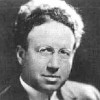I renounce war. I renounce war because of what it does to our own men. I have watched them coming gassed from the front-line trenches. I have seen the long, long hospital trains filled with their mutilated bodies. I have heard the cries of the crazed and the prayers of those who wanted to die and could not, and I remember the maimed and ruined men for whom the war is not yet over. I renounce war because of what it compels us to do to our enemies, bombing their mothers in villages, starving their children by blockades, laughing over our coffee cups about every damnable thing we have been able to do to them. I renounce war for its consequences, for the lies it lives on and propagates, for the undying hatreds it arouses, for the dictatorships it puts in place of democracy, for the starvation that stalks after it. I renounce war, and never again, directly or indirectly, will I sanction or support another.
Harry Emerson Fosdick (1878-1969) American clergyman, author, teacher
“The Unknown Soldier,” Armistice Day sermon, Riverside Church, New York City (1933-11-12)
(Source)
Reprinted in The Secret of Victorious Living (1934).
Fosdick had been a vocal proponent of the US entering World War I, and served in France as a chaplain to the American troops. His experiences there led him to become a leading pacifist (but anti-isolationist) during the post-war years. He maintained that position into World War II and through the 1950s and 60s.

